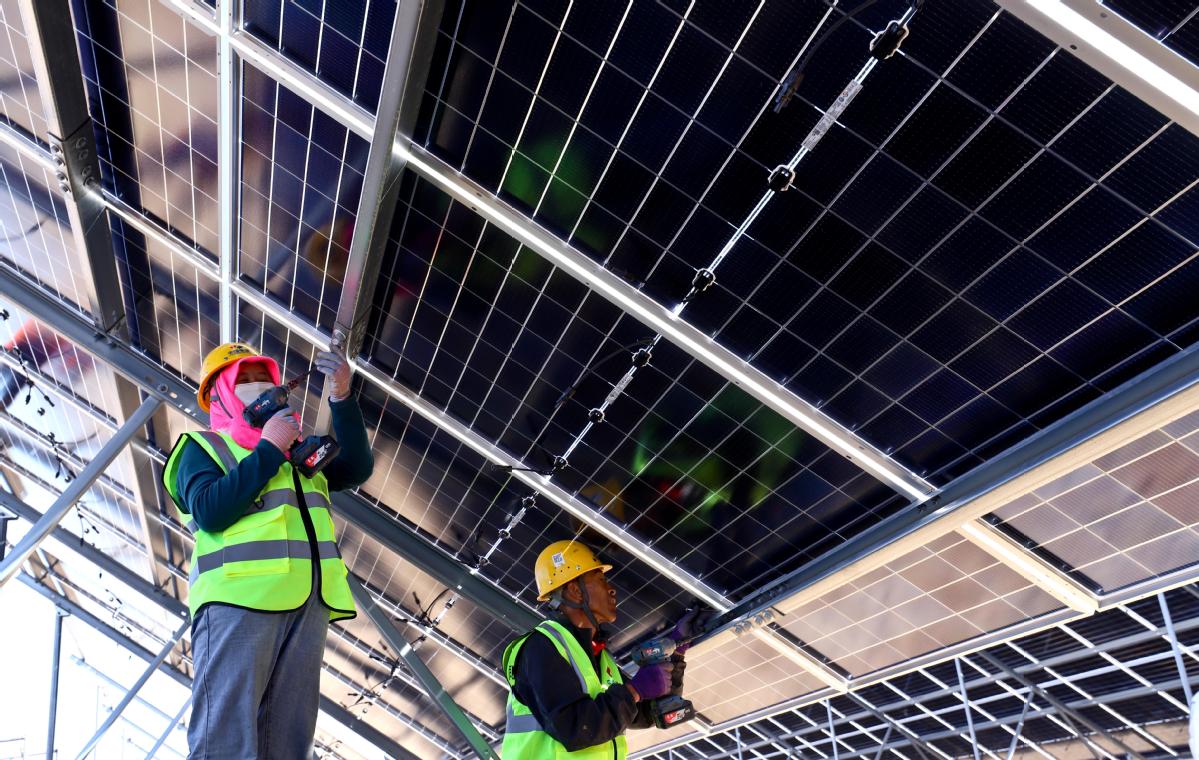
Employees install PV panels at a power plant in Zhangye, Gansu province, on Oct 1. WANG JIANG/FOR CHINA DAILY
The photovoltaic sector is in need of stricter measures to curb below-cost pricing practices that are destabilizing the solar power market, as recent falling prices have led to intense competition that impacts the entire sector, an industry association said.
The China Photovoltaic Industry Association (CPIA) said on Monday that the sector should enhance self-discipline, avoid unhealthy competition, resolve supply-demand imbalances and eliminate excess capacity in an orderly manner.
It hosted a special forum in Shanghai at which industry representatives agreed on measures to promote fair competition, phase out inefficient capacity and ensure sustainable development.
Since last year, the photovoltaic upstream polysilicon sector has faced a "price collapse" due to supply-demand imbalances, resulting in significant losses for companies. Currently, prices of polysilicon, wafers, cells and modules have fallen below cash production costs, putting pressure on the entire value chain.
Liu Hanyuan, chairman of new energy company Tongwei Co Ltd, said the slowdown in industry growth has led to oversupply and falling prices, exacerbated by intensified competition. As a result, each segment is incurring losses, with the extended supply chain amplifying these challenges.
Despite a threefold expansion in capacity, industry profit margins have decreased by about 70 percent, according to media outlet Yicai.com.
"The root of unhealthy competition lies in the limited market growth," said Lu Chuan, chairman of Chint Solar, suggesting companies restrain expansion and pricing to avoid price wars, while industry associations and regulatory bodies should guide production capacity and pricing mechanisms to stabilize the sector.
When existing markets can no longer support the survival and growth of more companies, lower-tier competition becomes an inevitable choice. However, this type of competition fails to drive overall industry progress. Instead, it leads to resource misallocation, stifles innovation and ultimately harms the sector's sustainable development, Lu said.
Analysts recommend stabilizing the market by promoting advanced technologies through demonstration projects and moving beyond low-bid competition strategies. They emphasize that strengthening self-discipline and implementing regulatory oversight will be essential to achieving sustainable growth and protecting the vitality of the industry.
Nicholas Lua, an analyst at global consultancy Rystad Energy, said the global solar market currently faces an oversupply situation.
Market consolidation in China could well be on the horizon as smaller and less efficient solar manufacturers exit the market, he said.
The third quarter has already seen multiple small domestic manufacturers undergo restructuring, and more such examples are expected in the coming months, Lua said.
While China has been at a pivotal moment in both national and global energy transitions, with rapid development seen in renewable energy in the country buoyed by supportive policies, competitive advancements in the domestic supply chain and a reliable grid system, production capacity across all key segments of the supply chain, from polysilicon down to solar panels, is currently more than double global solar demand, the consultancy said.
Over half of the additions to renewable capacity this year will come from China, Rystad Energy said. By the end of July, China had installed 1,206 gigawatts of wind and solar power capacity, exceeding the 1,200 GW national target set for 2030, meaning it has accomplished the target six years ahead of schedule.
On the other hand, solar wafers and polysilicon made in China have seen record-low prices this quarter, it added.
Lin Boqiang, head of the China Institute for Studies in Energy Policy at Xiamen University, said that intense competition among leading photovoltaic companies for market share has, to some extent, undermined efforts to promote the industry's healthy development.
Despite calls for greater industry self-discipline and sustainability, the effectiveness of these initiatives has been limited. The competition-driven focus on expanding market share has made it challenging for the industry to stabilize prices and phase out inefficient capacity, which could hinder the sector's long-term growth, he said.
Source: By Zheng Xin, chinadaily.com. Oct 16, 2024 [https://www.chinadaily.com.cn/a/202410/16/WS670ef9d8a310f1265a1c7c5a.html]

